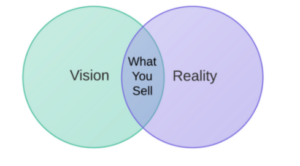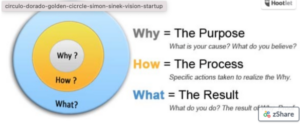VISION OF THE ENTREPRENEUR
Accelerate your business with these expert tips from the "Entrepreneur's Vision". Analyse and discover this TIP!
The vision, purpose and value of an entrepreneur are distinct but complementary concepts.
Here I explain what each of them consists of:
- Vision: the vision is a future image that the entrepreneur has of his or her company. It is a long-term statement that sets the goal and direction of the company. The vision is a reference point that guides the company to where it wants to go in the future. It is a dream that the entrepreneur has for his business, a clear and tangible image that inspires and motivates him to move forward.
- Purpose: purpose is the raison d'être of the company. It is why the company exists, its mission and its contribution to the world. The purpose is the essence of the company, what makes it unique and valuable to its customers, employees and society at large. The purpose is a motivating element for both the entrepreneur and the team that forms the company.
- Value: Value is what the company offers to its customers. It is the set of benefits that the customer derives from using the company's products or services. Value translates into customer satisfaction, customer loyalty and recommendation to other customers. Value is what differentiates the company from its competitors and what makes it relevant and successful.
In summary, an entrepreneur's vision, purpose and value are three key elements for the success of a company. Vision sets the long-term direction and goal of the company, purpose defines the company's raison d'être and value is the benefit offered to customers. These elements are complementary and mutually reinforcing to create a strong and impactful business. We entrepreneurs often jump into the pool with a rough idea of what we want to do, little money and a great desire to change the world... but paradoxically we don't think about what that means for us. And little by little the problems appear, and without a clear VISION, in the end the trees will not let us see the forest... and we will lose our bearings. ¡¡But let's start by talking about what vision is NOT! The vision is not about writing the famous "Mission, Vision and Values" that big companies like so much. (which most of them pass over the triumphal arch), and that, It remains expensive posters and pictures on the walls that are theoretically there to remind us of the "why" and to inspire us, but which people ignore as the toast to the sun that they are.
Nor does he talk about the enlightenment that happens to the "visionary" entrepreneur, who suddenly comes up with a happy idea that he considers to be absolutely innovative and necessary for today's society..., and which, of course, he does not confront with anyone, especially not with any client, lest they "steal" it or, worse still, say that it does not solve a real problem. Much better to wait to build that great product that will change the world... and if customers don't get it, spend more money on marketing to see if we can make them see it, or as it is more common to say, to educate customers. In order to solve this problem, light methodologies appear, which encourage us to confront our idea with the real world from the very beginning and find out if it really solves a problem... and if we have made a mistake, we will adjust the product together with the customers until it is something they need.
But we can fall into the Cheshire Cat dilemma:
"If you don't know where you're going, any road will get you there".
- Which way do I go?
- Well, where are you going?
- I don't know.
- Then it doesn't matter. If you don't know where you're going, any road will get you there.
And this is a big risk for any entrepreneur, as one of the main dangers of the methodologies Lean Startup (+) is that inadvertently and always in agreement with the client, they can lead you to do something you DON'T believe in, something that, if you don't have a vision, will make all the sense in the world to do and you will probably make money... but you will hate.
Because if you haven't thought about it before, you may end up with a vision such as:
"We're going to build things and see if we can find something that customers want, and then we'll improve from there.
AND THIS IS A BIG MISTAKE!
WHY IS VISION SO IMPORTANT FOR AN ENTREPRENEUR?
Mainly because it projects us into the future, helps us visualise what long-term success looks like for us and inspires us... something tremendously important in any company, but especially for a start-up where uncertainty reigns and where things change almost weekly. The vision speaks to the potential, the red lines we should not cross when building our business model and how we want to do things.
"If you know what you are like you will always know what to do".
It also gives us a framework for action, allows us to bypass distractions and focus on what is really important... but above all it inspires us. It helps us to make decisions in those moments when everything is confusing (and in a new company there are many!) and serves as the company's cricket. The vision is an idea of the entrepreneur's potential, of what he or she wants to achieve... not a set of short or medium-term goals.
TO GIVE YOU AN IDEA OF WHAT I'M TALKING ABOUT, HERE ARE SOME OF THE BEST KNOWN ONES:
- GOOGLE: organise the world's information, making it useful and universally accessible.
- MICROSOFT: a PC in every house.
- AMAZON: To be the most customer-centric company on the planet. To build a place where people can come to search and discover anything they want to buy online.
- DROPBOX: synchronise information between devices in a simple and convenient way (see their application to Y-Combinator where you can already see this vision).
- TWITTER: to be the pulse of the planet.
As the giant dinosaur robot FAKEGRIMLOCK says (if you don't know him, you should!):
"Vision is ambition, it is seeing what others cannot, it is turning the future into reality. Vision is not the how, it is the where".
Vision has a lot to do with what we "sell", and I am not only talking about customers, but also about suppliers, investors, employees...etc. If we want to convince someone to join us in our new venture, we must not only convey what we have now but why we are doing it, and inspire them with our vision... with that romantic side of the business (as we are reminded in Selling vision vs. Reality).

The vision is something that should not only be embraced by the founders of the company, but by everyone in the company, as it is part of the DNA of the new company... and when the whole team embraces the vision and believes in it, there is a great passion and shared energy focused on making it a reality. And this is a real competitive advantage (+), that will make you better than your competition.
TO BUILD THE VISION YOU SHOULD START WITH SOME SIMPLE QUESTIONS:
- Why do we do what we do?
- What would we like to see changed?
- Why do we exist?
- What do we believe in?
- What does our brand mean?
- What is our cause?
But the most important point is undoubtedly the first: start with the why... something that should guide any entrepreneur.

As Simon Sinek puts it, most companies are built on the WHAT? about the products or services offered by the company (the core of the CANVAS)... something that does not connect with the customer and that will make us easily replaceable. Other companies have gone one step further and have built their business on the HOW? about the way they do things (the right-hand side of the CANVAS)... which is certainly better, but not enough in an increasingly competitive world. But the key is to build on the WHY?sharing our vision with our customers, partners, investors and team... because, in reality, people buy visions and principles, more than just products (how else do you explain Apple's success?).
Simon Sinek explains in Start with the "Why?"
But let's not forget that all this talk about vision, although absolutely key, only helps us to be clear about the final goal (which may evolve over time), but it does not tell us what the path is, nor does it follow it for you... so, to paraphrase another of Simon Sinek's phrases:
"Words can inspire you... but only my actions lead to change".
The PURPOSE OF THE ENTREPRENEUR:
The purpose has to be your 'what for', but your deeper 'what for'. Purpose is the story that lives inside you and needs to be told. We all have a story inside us that needs to be told, and it is different from the story we tell ourselves. Many times, we tell ourselves things like I can't, I don't deserve, I'm not good enough....(see TIP biases). ¡¡Life is designed to be lived with purpose! It is not to be confused with passion, which is a word that comes from the Latin passio and means suffering. And this is not about suffering but about enjoyment.
AND HOW DO YOU KNOW IF YOU ARE GOING TO ENJOY YOUR PURPOSE?
Simply if you wake up motivated. Your purpose should cause you to wake up motivated on Mondays. It's like finding a source of energy, which gives you focus, clarity, which helps you make decisions; it's like your North Star. That's why purpose is still the pole star that guides your life, your business... everything. On the one hand, there is your personal purpose. And then each project has its own specific purpose that has to be aligned with yours. It is when there is no alignment between the two that tensions, crises... arise.
For example: There are people who are only motivated by the salary and not by what they do and that's when they say things like: "I want a change in my career, I feel stressed, I want to quit...".
Purpose is totally related to your VISION.
THE ENTREPRENEUR'S AMBITION
"Entrepreneurship means overcoming challenges, objectives and goals, some more ambitious than others.
What role does ambition play in all this? It is absolutely necessary for the entrepreneur. Ambition, which means the Intense and vehement desire to achieve something difficult to achieve is often associated with power, and it does not necessarily have to be so. Healthy and necessary ambition is when you want to achieve something that benefits many people. And when the aim is to put it at the service of others, ambition can help many people to benefit. On the other hand, if it is a selfish ambition, then it is not healthy. Ambition is an ingredient without which an entrepreneur is likely to be less responsive or less able to accelerate than one who is.
AN ENTREPRENEUR MUST BE AMBITIOUS BY NATURE
However, this ambition should be like healthy stress, allowing you to be alert, but if it becomes an obsession, it will probably end up blinding you from other areas. Just the right amount is fine; too much is bad. The ambitious entrepreneur tends to think big because the context, the market, the environment... will put them in the right place.. But, if you don't think big, you won't do anything in this world. To be ambitious is to want better things.
"I want to have a full professional life and help other people to have that full life too, to take better care of themselves".
Ambition in the right place is motivation. And that is what any project needs to get off the ground. Ambition, understood as the desire to surpass oneself and to achieve achievements and goals, is healthy. A goal has to be challenging, i.e. it challenges you, but, at the same time, it has to be realistic. That is healthy ambition. In that sense, our goals have to be ambitious, in the sense that they have to challenge you to step out of your comfort zone. On the other hand, if the goal is too ambitious, i.e. unattainable for you, by the same mechanism as before, your brain can become paralysed and stop going for it. The balance lies in knowing who you are, what your possibilities are, how much enthusiasm and excitement you have and what level of creativity you have.
ENTREPRENEURIAL VALUES:
We must explore the VALUES and objectives. In reality, the order will be set by the entrepreneur. However, it is advisable to begin by researching and raising awareness about the VALUES that are currently guiding his life. Since the values cannot be changed, i.e. we have the values we have.We didn't elect them! Whereas the objectives can be modified or changed. The VALUES and objectives must be aligned, so if one changes...it will be the objective. So why waste time defining and filtering objectives without being clear about whether or not they are aligned with the values? It is in the values that the entrepreneur will find the MOTIVATION which will serve as an impetus on your way to your goal. Once the values have been investigated, mainly with the famous "what for" question, you will be ready to continue with the filtering and definition of objectives.
APPLY THIS TIP TO YOUR PROJECT
QUIZZES
After the question and before think of yourself.
You can also consult other Related TIPs.
Learn more about mentoring by downloading this free EBOOK.
Do you want to help an entrepreneur by sharing your experience as a MENTOR? get accredited now.
Are you an entrepreneur? If you need support to boost your business, apply now for your mentor.
Rate this TIP!
Click on the stars to rate
Rating "12" - Average " - Average4.3"
No votes yet, be the first to vote!
We are sorry you did not find it useful.
Help us improve this TIP!
Leave us a comment and tell us how you would improve this TIP










